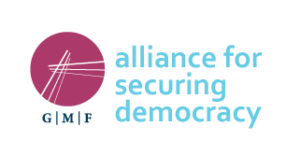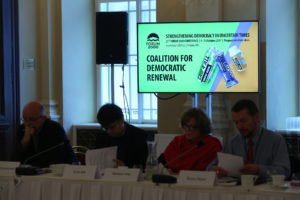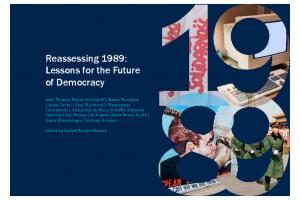1989 marks the fall of the #BerlinWall, the birth of modern #Internet, and democracy uprisings in Poland and China. While these events (and many more) should be celebrated, there is also good reason to reassess this momentous year: https://t.co/SYpINUoFVl #Reassessing1989 pic.twitter.com/KjhDnAbh3X
— German Marshall Fund (@gmfus) September 16, 2019
Vladimir Putin’s kleptocratic regime has developed a network of patrons across Europe, spreading corruption that weakens democracies from the inside and helps Putin to maintain power, according to a new report.
Democracies, however, have not yet grasped the magnitude of the resurgent authoritarian challenge. This recognition – acknowledging that a new systemic challenge has already begun – must be the first step in an effective response, argues Laura Rosenberger, Senior Fellow and Director of the Alliance for Securing Democracy.
 The democratic response needs to remain consistent with democratic values and involve humility and a powerful push for renewal, she writes in Authoritarian Advance: How Authoritarian Regimes Upended Assumptions about Democratic Expansion. We must jettison the illusions that democracies are self-perpetuating and certain victors, or that technology and greater trade and investment inherently favor democratic growth. This will require more than tweaking around the policy edges, she asserts in a contribution to a German Marshall Fundreport, “Reassessing 1989′:
The democratic response needs to remain consistent with democratic values and involve humility and a powerful push for renewal, she writes in Authoritarian Advance: How Authoritarian Regimes Upended Assumptions about Democratic Expansion. We must jettison the illusions that democracies are self-perpetuating and certain victors, or that technology and greater trade and investment inherently favor democratic growth. This will require more than tweaking around the policy edges, she asserts in a contribution to a German Marshall Fundreport, “Reassessing 1989′:
- First, we need to recognize where this battle is playing out and show up. Standards-setting processes for technologies like 5G and artificial intelligence may seem technical and niche, but they will play a critical role in defining the information architecture of the future….
-

21st Forum 2000 Conference
Second, democracies need to present a competitive offer. Critical to competing is reinvesting in ourselves. That means renewing our democratic purpose through civic education and investing in infrastructure and our education system more broadly. … Democracies need to recognize the vulnerabilities and weaknesses that have made them less responsive to citizens’ demands, driven polarization, and opened space for alternative systems…..
- Third, we need to update our institutions to meet the challenges of today. Borders and distances no longer protect against many of the threats democracies face, and the battle is not just for territory but for minds, putting unwitting citizens on the front lines in information battles….
 Finally, sustaining a global system that supports democracies and closes space for authoritarian expansion requires democracies to work together. This starts with remembering who our friends are, and prioritizing those relationships and the values that underpin them. Democracies need to share lessons with one another, prevent the formation of fissures between us, and bolster liberal democracies that are under threat. RTWT
Finally, sustaining a global system that supports democracies and closes space for authoritarian expansion requires democracies to work together. This starts with remembering who our friends are, and prioritizing those relationships and the values that underpin them. Democracies need to share lessons with one another, prevent the formation of fissures between us, and bolster liberal democracies that are under threat. RTWT







